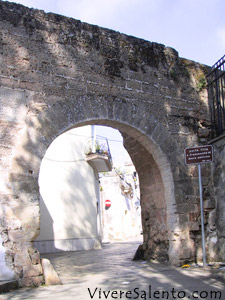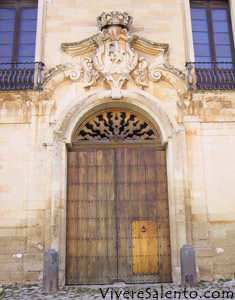|
|

| Inhabitants’name: Sternatiesi |
The civic coat of arms of Sternatia represents a dragon and
the name of this village has been modified several
 times
so far: in the XVI century it was "Stornatea," in the following century
"Starnatio," later in 1620 it became "Sternaeta" ,"Stenatia"(1635), "Sternaia"
(1651), "Stornataf" (1714) and "Sternatea" in 1738. Jacob defines it
"Sternathia" while Rohlfs "Starnaitta" until in the XIX century the name
"Sternatia" was read in a Greek code. According to some historians "Sternatia"
derives from the Greek and means "percussion of the breast," thus making
reference to the gesture made in a moment of pain for the loss of someone you
love. However, there are other hypothesis : the name might mean "tilled ground"
or "vineyard." Sternatia was founded during the Greek colonization: indeed, the
Greek had a strong influence on this village and the Greek rite continued until
1661; what is more many people still today speak the "griko" (Greek dialect) .
Sternatia was a Casale during the Norman (1100) and Svevian domination (1256).
In 1192 the king Tancredi gave the casale to Berlinghero Chiaromonte, who
governed it so well that in 1278 Galatina became part of Sternatia. In 1334 the
walls were built around the inhabited centre as you can read in a paper of the
XVI century. The Orsini Del Balzo family governed it from 1398 to 1463 . In 1593
Girolamo Personé bought the feud for 33,000 dukedoms and sold it times
so far: in the XVI century it was "Stornatea," in the following century
"Starnatio," later in 1620 it became "Sternaeta" ,"Stenatia"(1635), "Sternaia"
(1651), "Stornataf" (1714) and "Sternatea" in 1738. Jacob defines it
"Sternathia" while Rohlfs "Starnaitta" until in the XIX century the name
"Sternatia" was read in a Greek code. According to some historians "Sternatia"
derives from the Greek and means "percussion of the breast," thus making
reference to the gesture made in a moment of pain for the loss of someone you
love. However, there are other hypothesis : the name might mean "tilled ground"
or "vineyard." Sternatia was founded during the Greek colonization: indeed, the
Greek had a strong influence on this village and the Greek rite continued until
1661; what is more many people still today speak the "griko" (Greek dialect) .
Sternatia was a Casale during the Norman (1100) and Svevian domination (1256).
In 1192 the king Tancredi gave the casale to Berlinghero Chiaromonte, who
governed it so well that in 1278 Galatina became part of Sternatia. In 1334 the
walls were built around the inhabited centre as you can read in a paper of the
XVI century. The Orsini Del Balzo family governed it from 1398 to 1463 . In 1593
Girolamo Personé bought the feud for 33,000 dukedoms and sold it in 1598 to the barons Cicala for 40,000 dukedoms.In 1733 the Granafei marquises,
coming from Albania, acquired Sternatia; later it was governed by the
D'Aragonas, the Angiò and the viceroy of Spain until 1806. The most important
native characters are Cesare De Santis, Orazio Specchia and Marino Paglia.
Paglia was born in 1781: he belonged to a poor family and in 1805 he became a
priest after graduating in theology; he was elected Bishop of Salerno , where he
died in 1858.
in 1598 to the barons Cicala for 40,000 dukedoms.In 1733 the Granafei marquises,
coming from Albania, acquired Sternatia; later it was governed by the
D'Aragonas, the Angiò and the viceroy of Spain until 1806. The most important
native characters are Cesare De Santis, Orazio Specchia and Marino Paglia.
Paglia was born in 1781: he belonged to a poor family and in 1805 he became a
priest after graduating in theology; he was elected Bishop of Salerno , where he
died in 1858.
|